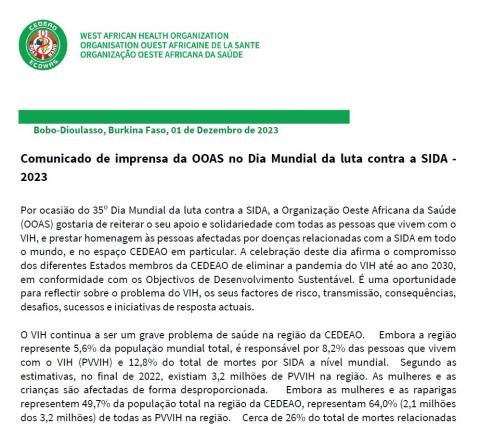
WAHO Press Release on World AIDS Day 2023
On the occasion of the 35th World AIDS Day, the West African Health Organization (WAHO) would like to reiterate its support and solidarity with all people living with HIV, and to pay tribute to those affected by AIDS-related illnesses throughout the world, and in the ECOWAS region in particular. The celebration of this day affirms the commitment of the various ECOWAS Member States to eliminate the HIV pandemic by the year 2030, in line with the Sustainable Development Goals. It is an opportunity to reflect on the HIV problem, its risk factors, transmission, consequences, challenges, successes and current response initiatives.
HIV remains a major health problem in the ECOWAS region. While the region accounts for the 5.6% of the total world population, it accounts for 8.2% of the persons living with HIV (PLHIV) and 12.8% of the total global AIDS deaths. There were an estimated 3.2 million PLHIVs in the region by the end of 2022. Women and children are disproportionately affected. While women and girls represent 49.7% of the total population in the ECOWAS region, they account for 64.0% (2.1 million of the 3.2 million) of all PLHIV in the region. About 26% of the total AIDS-related deaths in children younger than 15 years in the world occur in the ECOWAS region. PLHIVs, particularly key populations, face stigma and discrimination, which hinder access to quality care.
Between 2010 and 2022, new HIV infections and AIDS-related deaths in the ECOWAS region fell by 53% and 50% respectively, but still not enough to reach the 95%-95%-95% targets. Cote d’Ivoire and Togo achieved the largest reductions over this period. At the end of 2022, the ECOWAS region achieved 89%-86%-77%, meaning 89% of PHLIVs knew their status, 86% received treatment, and 77% achieved viral suppression. Several countries are introducing pre-exposure prophylaxis and HIV self-testing programmes. Togo is within reach of achieving the 95-95-95 targets.
This year's theme, "Let Communities Lead", recognises the importance of community-led actions in ending the AIDS pandemic. PHLIVs live in communities. These communities should be at the frontline of the HIV response. They need to be empowered through person-centred public health services, with adequate knowledge and skills to enable them to monitor implementation of services and demand accountability from service providers. The involvement and effective participation of communities in all strategies, the mobilization of the necessary resources, and the elimination of stigma and discrimination constitute an urgent imperative.
Financial investment in HIV response is crucial, particularly after the recent COVID 19 pandemic-induced disruptions. According to the UNAIDS, the countries and regions that have the most financial investments, such as in eastern and southern Africa, have made the most progress. Other elements for progress are strengthened the legal and policy frameworks that ensure the human rights of PHLIVs, strengthened laboratory services, improved access to antiretroviral therapy and lifesaving technologies, preventing disruptions in testing and clinical management as well as data-driven decision making. Community-led response champions the respect for the human rights of KPs through the removal of the social, economic and legal barriers to access to health services.
We have to sustain the momentum of current global HIV support from the global community. Under the ECOWAS integrated Regional Strategy for HIV, Tuberculosis, Hepatitis B & C and Sexual and Reproductive Health and Rights among Key Populations (KP) endorsed by health ministers in August 2020, Member States committed to protect the rights of vulnerable people. Let us work together to build strong and resilient public institutions that promote the human rights of vulnerable and KPs. The youth are vital members of the community who should be provided with adequate unbiased information on sexual health.
WAHO joins the international community to call for increased funding, improved governance, strong community-health systems. We would like to thank Member States, all our technical and financial partners, NGOs, the civil society, community and religious leaders for their commitment and support to the HIV response.
Let the communities lead!
Together, we shall prevail in the fight against HIV.
